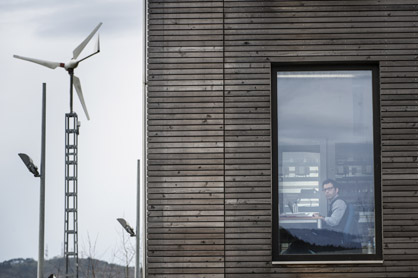18 million boost for green technology
 Iceland, Liechtenstein and Norway are providing €18 million to the environmental and climate change-related research and technology programme in Spain. This is set to be a win-win for the three donor countries, Spain and the environment.
Iceland, Liechtenstein and Norway are providing €18 million to the environmental and climate change-related research and technology programme in Spain. This is set to be a win-win for the three donor countries, Spain and the environment.
01.07.2014
Spain is a recognised global leader in renewable energy production. This has stimulated the growth of a thriving industry based on innovation, research and development (R&D). Remarkable figures from the Spanish grid operator show that greenhouse gas emissions from Spain’s power sector are likely to have fallen by 23% in 2013 as power generation from wind turbines and hydroelectric plants soared.
In funding company-driven, innovative projects, the programme is looking to build on this success. Increasing knowledge transfer from universities and research bodies to innovative businesses operating in the environmental sector is an important aspect. Almost 100 projects were approved in the first Open Call out of an initial 185 proposals. One hundred and eight companies are taking part. Eighty-five involve universities and research centres. These projects are now getting up and running. A further 150 applications were submitted in the second call for proposals and 101 have been approved. 110 companies are involved.
The projects selected so far are wide-ranging, from biofuel development to research on marine power generation and energy storage systems. But what makes this programme really distinctive is the mix of grants and loans. The Centre for Technological Industrial Development (CDTI) - the Spanish public body that runs the programme - is providing ‘soft’ loans (i.e. offering flexible or below-market repayment rates) from 75% to 85% of the eligible costs.
"By harnessing soft loans and grants, you minimise the risk for the company and maximise the outcome,” said Luis Enrique San José, CDTI’s Head of Analysis and Investment. “The programme is opportune. It comes at a time when investing in the development of new technologies is more important than ever to overcome the economic crisis, especially for small and medium-sized enterprises. This investment can help companies achieve a commercial result in a difficult economic climate,” he added.
Spain’s competitive and hi-tech environmental sector presents opportunities for exporters of renewable energy technology from the donor countries. The potential to form partnerships with Spanish companies has been well exploited. Nearly half of the projects have donor partners.
One successful project is being led by Ingeteam, a market leader in power and control electronics, electrical equipment and power plants. They have teamed up with Norwegian company Ulstein to develop new technology for power generation in marine vessels to improve efficiency and performance. Ulstein has valuable experience in marine electronics and developing system solutions for shipyards and ship owners worldwide.
Emissions from shipping are growing and are a big source of pollution. The concept developed will facilitate the integration of renewable energy systems and advanced energy storage systems in ships. Improvements of 25-30% are expected in terms of energy efficiency. Reduced fuel consumption will have a knock-on effect with significant cuts in emissions and pollution expected.
Another project being run by Iberdrola - Spain’s number one energy group - is looking at the integration of power generated by photovoltaic (PV) plants to the energy grid. New large-scale PV farms are to be designed and research carried out into improving energy storage systems. Leading research organisations Tecnalia (Spain) and SINTEF (Norway) are bringing their expertise in energy storage technology as sub-contractors in the project.